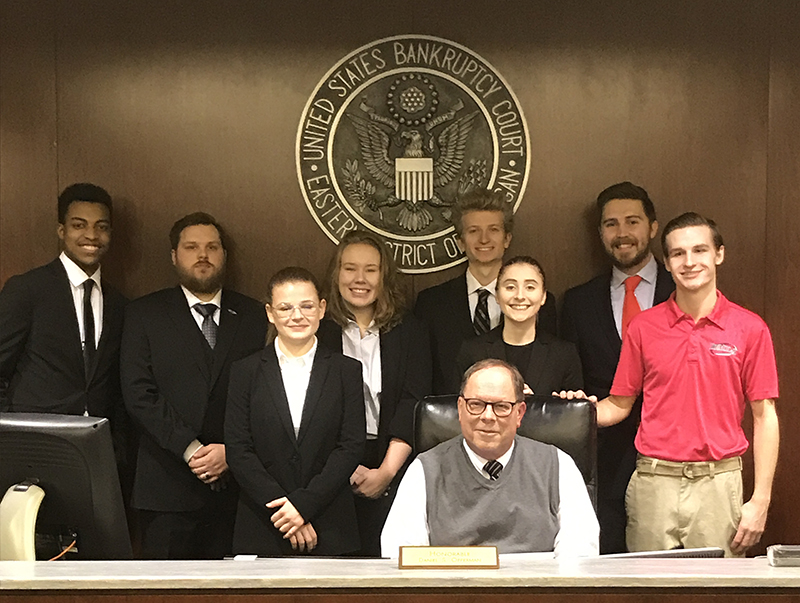Moot Court


EMU's Moot Court students with Judge Daniel S. Opperman
Eastern Michigan first participated in American Moot Court Association competitions in 2013 and was recognized as the 14th Best Program in the Country after only three years. Around 450 teams from college and universities across the U.S. compete in regional and national competitions in which students simulate appellate court proceedings.
To learn more, please contact Dr. Barry Pyle.
The Basics
Two-person teams compete in oral arguments and written legal briefs concerning a fictional case being appealed to the U.S. Supreme Court out of the State of Olympus. Cases include a lower court record and decision being appealed as well as numerous Court and lower court precedents. Teams prepare roles as petitioner and respondent (i.e., both sides of constitutional questions before the Court). Panels of attorneys and actual judges assess and comment on students’ oral arguments and written briefs.
The Students
Most team members who chose to go to law school have been able to achieve that goal.
Benefits of Moot Court
Students gain knowledge of American law and legal systems, including case flow through state and federal judicial systems, appellate court procedure, structure and content of appellate briefs and oral arguments and substantive and procedural issues in constitutional law.
Students get the opportunity to develop law-related skills, including legal research, legal citation, legal writing, argument construction, courtroom decorum, legal and logical reasoning, answering legal questions from a judge, case law analysis, legal argument and arguing both sides of a case.
In addition, students develop strengthen countless other life skills, including critical thinking, public speaking, complex problem solving, adaptive and extemporaneous speaking, team work, judgment and decision-making, performance under pressure and accepting constructive criticism.
Alumni Testimonials
“As a first-year law student at one of the top ten law schools in the country, I am often asked what I did during my undergraduate education that helped me prepare for law school. My response is always the same. The most valuable experience I had was my participation in moot court.
Moot court taught me how to read and understand court opinions. I am able to read an opinion, understand what the court is saying, and apply that to course material in ways that my classmates are not yet able to do, since, for many of them, this is their first exposure to legal opinions. Moot court has also had a phenomenal impact on my writing. The final project in one of my courses is to write an appellate brief, which is something I did regularly for moot court. I understand how to formulate a legal argument and express that clearly in writing, with proper case citations.
I also find myself using the oral presentation skills I learned at moot court in my classes and extracurricular activities. When professors call on students and ask them questions, I remain unfazed and am able to enter a dialogue with my professor that supports my learning. After having a panel of judges stare you down and interrogate you with questions, being challenged on an opinion in class is much less stressful. I know many students who are terrified of being called on, a feeling that I have never experienced because moot court has made me into a much better public speaker and one who is confident in her abilities to communicate."
- Maya Rich graduated from the University of Virginia School of Law in 2019. She now works for a Manhattan law firm.
---
"Back in my senior year, several students and I, along with a faculty adviser, started the moot court program at EMU. My only complaint about the moot court program is that I didn’t get to do it longer. I’m still grateful I had the opportunity to compete for a year, as the program was the best possible preparation I could have gotten for law school. Moot court involves reading a number of real-life Supreme Court cases, Courts of Appeals cases, and statutes, and using them to shape a compelling argument. Learning how to size up a court case (some of which run nearly 100 pages long) quickly and effectively is a skill I use every day both in law school and in the legal internships I’ve done.
The program has kept me involved as an alumni. Whenever I’m back in town, I try to come by to help the team. This can be by working through the legal problem at the beginning of the semester, going over the court cases, or serving as a judge in practice rounds. I plan to stay involved for as long as the program is around.
- Nino Monea graduated from Harvard Law School in 2017. He has joined the U.S. Army Judge Advocate General’s (JAG) Corps as a first lieutenant.

